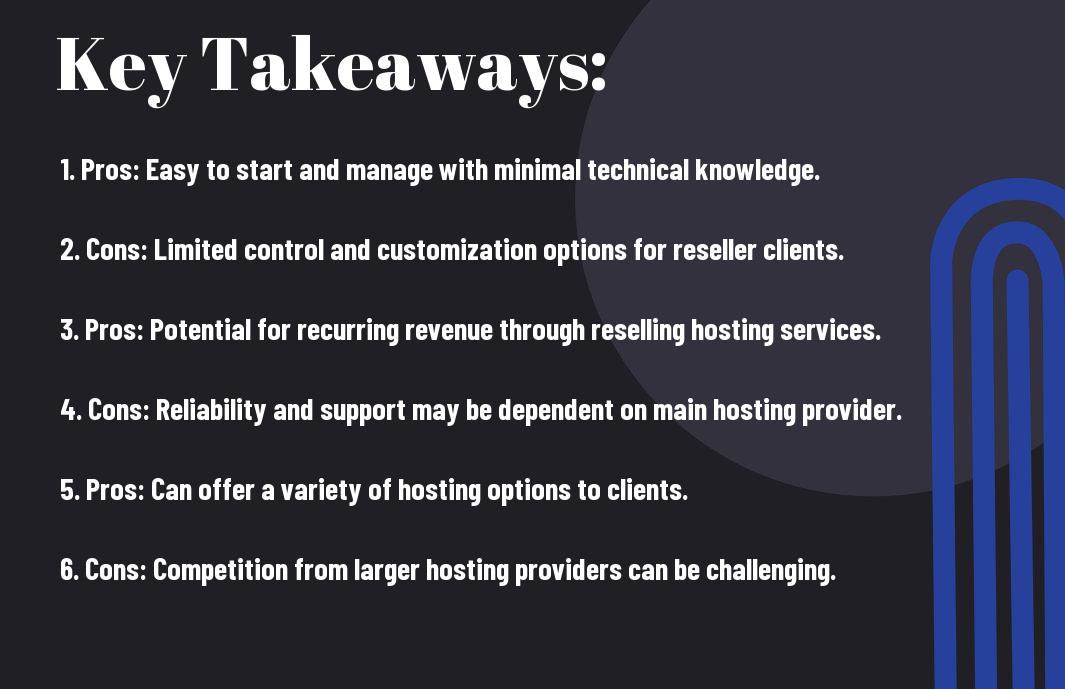Embarking on the journey of launching your own website can be an exciting yet daunting task. One of the decisions you will need to make is whether to utilize a website hosting reseller to manage your web hosting needs. One of the enticing advantages of using a website hosting reseller is that it can save you time and effort in managing the technical aspects of web hosting, allowing you to focus on other aspects of your website. Additionally, resellers often offer competitive pricing and packages, which can be more cost-effective for your budget. However, it is important to consider the potential drawbacks as well. One of the main concerns is the lack of direct control over server management and technical support, which could lead to potential issues with uptime and customer support. Furthermore, there may be security risks associated with reseller hosting, as you are essentially sharing server resources with other users. It is crucial to carefully weigh the pros and cons before deciding if a website hosting reseller is the right choice for your website.
Key Takeaways:
- Pros of using a website hosting reseller:
Hosting resellers often offer competitive pricing, providing cost-effective solutions for individuals and businesses looking to host their websites.
Access to a variety of services and features.
Resellers typically offer a range of hosting options, from shared hosting to dedicated servers, providing flexibility for different needs and budgets.
This can be particularly beneficial for small businesses or individuals with limited technical knowledge. - Cons of using a website hosting reseller:
Limited control and technical support.
Using a reseller means relying on their customer support and technical expertise.
This can lead to potential issues if the reseller does not provide reliable support or experiences technical difficulties.
Additionally, resellers may limit the customization options available for hosting.
Potential for overselling and overcrowding.
Since resellers purchase hosting plans from larger providers and resell them to customers, there is a risk of overselling and overcrowding on servers, leading to decreased performance and reliability for your website.

Pros of Using a Website Hosting Reseller
Assuming you are considering using a website hosting reseller, you may be wondering about the benefits of this option. Here are some pros to keep in mind as you weigh your decision. For more in-depth information, you can also check out this article on Is Reseller Hosting Worth It? – (Pros & Cons).
Cost-Effective Solutions
When you opt for a website hosting reseller, you are able to avail of cost-effective solutions that can help you save money in the long run. As a reseller, you can purchase hosting services in bulk, obtaining a better rate than if you were to purchase them individually. This means you can offer competitive pricing to your clients while still making a profit.
Simplified Management and Support
Managing a website hosting service can be complex, but when you use a reseller, you can benefit from simplified management and support. Your hosting provider will handle the technical aspects of server maintenance, security, and support, allowing you to focus on building your client base and providing excellent customer service.
Value-Added Reseller Benefits
As a website hosting reseller, you can often take advantage of value-added reseller benefits such as customizable hosting plans, white-label branding opportunities, and additional services. These benefits can give you an edge over your competition and attract more clients to your business.
Flexibility and Scalability
One of the biggest advantages of using a website hosting reseller is the flexibility and scalability it offers. You can easily upgrade or downgrade your hosting packages according to your needs, without the hassle of switching providers or dealing with complex migration processes. This agility allows you to adapt to changing client demands and business growth.
Cons of Using a Website Hosting Reseller
Not every aspect of using a website hosting reseller is advantageous. There are some potential drawbacks that you should consider before making a decision. It is crucial to weigh the pros and cons before committing to a hosting reseller. To get a better understanding of the disadvantages of using a website hosting reseller, you can read this article on What Are The Advantages & Disadvantages Of Using …
Potential for Reduced Performance
When using a website hosting reseller, there is a possibility of experiencing reduced performance compared to using a dedicated hosting service. This can be due to shared resources and server overload from other websites hosted by the reseller. This could lead to slower loading times and potential downtime for your website.
Possible Lack of Control
Another potential drawback of using a website hosting reseller is the lack of control over the server and hosting environment. Since the reseller manages the server, you may not have the ability to customize server settings or install certain software that you would have with a dedicated hosting service.
Concerns Over Resource Allocation
With a website hosting reseller, you may encounter resource allocation issues if the reseller’s servers are not properly managed. This could lead to limited bandwidth, disk space, and other resources, impacting the performance and functionality of your website.
The Intermediary Factor and Customer Service Issues
Using a website hosting reseller introduces an intermediary between you and the actual web hosting provider. This can potentially lead to communication barriers and customer service issues as you may have to rely on the reseller for support instead of dealing directly with the hosting provider.
Comparing Reseller Hosting to Traditional Hosting
To help you understand the differences between reseller hosting and traditional hosting, here is a breakdown of the key factors in each:
| Reseller Hosting | Traditional Hosting |
| You have the ability to sell hosting services to clients, acting as a middleman between the web hosting provider and the end-user. | You are the end-user, purchasing hosting services directly from the web hosting provider. |
| You can create and manage multiple hosting accounts under your own brand, making it a more scalable option for businesses with multiple clients. | You have one hosting account for your own website. |
| You may have access to additional features such as billing software, customer support, and server management tools to help you run your hosting business. | You rely on the web hosting provider for technical support and server management. |
| You have the potential to earn a profit by reselling hosting services to clients. | You pay for hosting services based on your own website’s needs. |
Key Differences
When comparing reseller hosting to traditional hosting, the key differences lie in the ability to resell hosting services, manage multiple accounts, access additional features, and potentially earn a profit. With reseller hosting, you take on the role of a hosting provider yourself, whereas with traditional hosting, you are solely a consumer of hosting services.
Making an Informed Decision Based on Business Needs
It is important to consider your business needs when deciding between reseller hosting and traditional hosting. If you are looking to offer hosting services to clients and potentially generate additional revenue, reseller hosting may be the better option for you. On the other hand, if you simply need hosting services for your own website without the need to manage multiple accounts or resell services, traditional hosting may be the more straightforward choice. Evaluating your business goals and requirements will help you make an informed decision.

The Pros and Cons of Using a Website Hosting Reseller
Ultimately, using a website hosting reseller can be a convenient and cost-effective option for your business. You can benefit from the reseller’s technical expertise, customer support, and infrastructure without having to invest in your own servers and IT personnel. Additionally, resellers often offer competitive pricing and scalability options. However, there are also drawbacks to consider. You may encounter limitations on resources, customization options, and control over your hosting environment. There is also the risk of dealing with unreliable or unresponsive resellers. It’s important to carefully weigh the pros and cons before making a decision to use a website hosting reseller for your business.
FAQ: The Pros and Cons of Using a Website Hosting Reseller
Q: What is a website hosting reseller?
A: A website hosting reseller is a company or individual that purchases hosting services from a larger hosting provider and then sells them to their own clients. They act as a middleman between the original hosting provider and the end user.
Q: What are the pros of using a website hosting reseller?
A: One of the main advantages of using a website hosting reseller is the cost savings. Resellers often offer hosting packages at a lower price than the original provider. Additionally, resellers may provide personalized customer support and additional services such as website design and maintenance.
Q: What are the cons of using a website hosting reseller?
A: One potential drawback of using a website hosting reseller is the lack of direct control over the hosting environment. Since the reseller is ultimately relying on the original provider’s infrastructure, any technical issues or downtime may be out of their direct control. Additionally, some resellers may have limited resources and may not be able to provide the same level of performance and scalability as the original provider.
Q: What should I consider when choosing a website hosting reseller?
A: When selecting a website hosting reseller, it is important to consider factors such as the reseller’s reputation, reliability, and the level of support they offer. It’s also important to understand the terms of the reseller agreement, including any limitations or restrictions imposed by the original hosting provider.
Q: Can I switch from a website hosting reseller to a direct hosting provider?
A: Yes, it is typically possible to migrate your website from a reseller to a direct hosting provider. However, this process may involve some downtime and technical complexities, so it’s important to carefully plan the transition and ensure that all data and settings are properly transferred.
CATEGORY:Web Hosting

